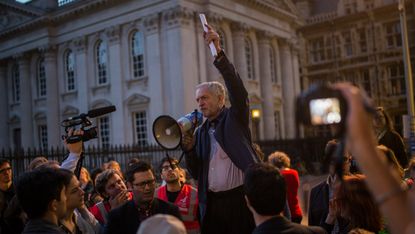Is there a future for centrist Labour?
Tony Blair fears it may be too late for ‘moderates’ to take back control of the party from Corbyn

Tony Blair has spoken of his concerns that “moderates” may never be able to take back control of Labour, following the “profound change” in the party under Jeremy Corbyn’s leadership.
The former prime minister told the BBC’s Political Thinking with Nick Robinson podcast that he believed the party may be irredeemably “lost”.
His comments have prompted a backlash from Corbyn supporters including Jon Lansman, founder of the Momentum movement, who tweeted that Labour would “never” return to Blair’s policies.
Subscribe to The Week
Escape your echo chamber. Get the facts behind the news, plus analysis from multiple perspectives.

Sign up for The Week's Free Newsletters
From our morning news briefing to a weekly Good News Newsletter, get the best of The Week delivered directly to your inbox.
From our morning news briefing to a weekly Good News Newsletter, get the best of The Week delivered directly to your inbox.
With Labour now weathering a storm of schisms, factions and disunity over its stances on everything from Brexit to anti-Semitism, what does the party’s future hold? Here are three possible scenarios for the future of the opposition:
Labour becomes a fully Corbynite party
In this scenario, Corbynite MPs and ministers hold fast in a “civil war” within the party, consolidating their power through a purge of dissenters.
This war is arguably under way already, with “an influx of new members demanding more of a say over policy and election candidates, and agitating to remove some MPs” deemed insufficiently pro-Corbyn, says the BBC’s Susana Mendonca.
In recent weeks, constituency no confidence votes have been levelled against a series of anti-Corbyn MPs, including Frank Field, who quit the parliamentary party last week over its handling of the ongoing anti-Semitism scandal.
But where can chased-out Labour centrists turn? Writing in The Daily Telegraph, former Scottish Labour MP Tom Harris notes that Liberal Democrat leader Vince Cable, who is due to step down next year, has said that he wants his successor to transform his party into “a movement for moderates”.
Harris asks: “Could this have been any more blatantly aimed at those Labour MPs who have made very little secret of their plans to depart their party in the next few months?”
He suggests that Cable may be attempting to “persuade a serving Labour MP to pick up the gauntlet and lead a new, revitalised – perhaps even renamed – version of the Lib Dems.”
The moderates take back control
The i news site reported last month that around 12 Labour MPs were believed “to have met in a Sussex farmhouse to discuss policy and prepare to ‘step in’ after the leadership’s ‘collapse’”. A source was quoted as saying: “We are getting together regularly to discuss how to take back control of the party.”
However, overwhelming grass-roots support for Corbyn seems an insurmountable obstacle to a successful coup. “A poll showing that 80% of Labour members think he’s doing a good job as leader highlights how impossible it would be to remove him,” says The Spectator.
The Times’ Philip Collins suggests that some moderate Labour MPs instead “hope that the Tories choose their next leader wisely”, in the belief that a Conservative landslide would end the Corbyn era.
The party splits
This would be the most devastating scenario for Labour: Blairites and moderates leaving Labour entirely to form a new party.
But many commentators suggest that a splinter movement would fight an uphill battle from the start.
The Guardian’s Owen Jones writes that “if a split ever happens, we know what it will be: a Blairite tribute act, a roadshow for the discredited politicians whose ideology helped plunge Britain into its current mess”. Blairism “belongs to a completely different political epoch”, Jones adds.
Meanwhile, The Spectator’s James Forsyth says that any breakaway movement would probably form a “classic social democratic party”, but notes that “across Europe, these parties are in crisis”.
“The French Socialists came fifth in the 2017 presidential election, the German Social Democrats have just recorded their worst result since the formation of the Federal Republic, and in Italy earlier this year, the Partito Democratico received less than 20% of the vote,” he says.
“Those hoping for a realignment of the British political system a la Macron will be disappointed,” Forsyth concludes.
Create an account with the same email registered to your subscription to unlock access.
Sign up for Today's Best Articles in your inbox
A free daily email with the biggest news stories of the day – and the best features from TheWeek.com
-
 'Elevating Earth Day into a national holiday is not radical — it's practical'
'Elevating Earth Day into a national holiday is not radical — it's practical'Instant Opinion Opinion, comment and editorials of the day
By Harold Maass, The Week US Published
-
 UAW scores historic win in South at VW plant
UAW scores historic win in South at VW plantSpeed Read Volkswagen workers in Tennessee have voted to join the United Auto Workers union
By Peter Weber, The Week US Published
-
 Today's political cartoons - April 22, 2024
Today's political cartoons - April 22, 2024Cartoons Monday's cartoons - dystopian laughs, WNBA salaries, and more
By The Week US Published
-
 Mark Menzies: Tories investigate MP after 'bad people' cash claims
Mark Menzies: Tories investigate MP after 'bad people' cash claimsSpeed Read Fylde MP will sit as an independent while party looks into allegations he misused campaign funds on medical expenses and blackmail pay-out
By Arion McNicoll, The Week UK Published
-
 Is David Cameron overshadowing Rishi Sunak?
Is David Cameron overshadowing Rishi Sunak?Talking Point Current PM faces 'thorny dilemma' as predecessor enjoys return to world stage
By The Week UK Published
-
 How will honeytrap scandal change Westminster?
How will honeytrap scandal change Westminster?Today's Big Question Security procedures laid bare by spear phishing attack as focus shifts to 'political insider' being responsible
By The Week UK Published
-
 Barack Obama 'behind Starmer transformation'
Barack Obama 'behind Starmer transformation'Under The Radar The former US president urged Labour leader to 'talk more openly'
By Chas Newkey-Burden, The Week UK Published
-
 Will Aukus pact survive a second Trump presidency?
Will Aukus pact survive a second Trump presidency?Today's Big Question US, UK and Australia seek to expand 'game-changer' defence partnership ahead of Republican's possible return to White House
By Sorcha Bradley, The Week UK Published
-
 Farewell to Theresa May: a PM consumed by Brexit
Farewell to Theresa May: a PM consumed by BrexitTalking Point Maidenhead MP standing down at next general election
By The Week UK Published
-
 Britain's biggest political donors
Britain's biggest political donorsThe Explainer With the 2024 general election set to be the highest-spending contest ever we look at who is giving to which party and why
By The Week UK Published
-
 Can Boris Johnson save Rishi Sunak?
Can Boris Johnson save Rishi Sunak?Today's Big Question Former PM could 'make the difference' between losing the next election and annihilation
By The Week UK Published